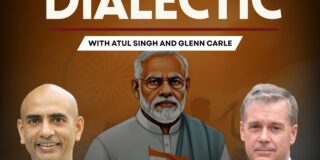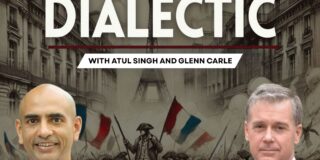Editor-in-Chief Atul Singh speaks with Edmund Ghareeb, a historian and author, about Enemy of the Sun: Poetry of Palestinian Resistance, a landmark anthology of Palestinian resistance poetry first published in 1970. The book’s story is as dramatic as the poems it contains: rejected by mainstream publishers, rescued by black activists, forgotten for decades then revived with new resonance in the 21st century. What emerges is the story of a people who turned poetry into testimony — a medium for resistance, identity and survival when every political structure failed them.
Enemy of the Sun’s story
Ghareeb traces the book’s origins to 1969, when he was a student at Georgetown University in Washington, DC, and traveled to the Middle East. There, he interviewed Palestine Liberation Organization (PLO) chairman Yasser Arafat in Jordan — an encounter that unexpectedly drew wide attention. The night before he left, he attended a poetry reading featuring Palestinian poets who are “still in the green line in Israel,” some recently released from prison. Struck by what he heard, he returned to the United States and began translating poems by poets Samih al-Qasim, Mahmoud Darwish and others for student newspapers.
A month later, he connected with Naseer Aruri, an American human rights activist and professor of Middle Eastern politics. He was also translating Palestinian poetry, so the two collaborated to assemble a manuscript. This was then rejected by 13 publishers. The social justice-focused Beacon Press briefly showed interest before backing out, telling Ghareeb that their orders came from the higher-ups.
The breakthrough came through Drum and Spear Press, an Afro-diasporic publishing house founded by activists from the Student Nonviolent Coordinating Committee. At first, they refused, saying: “We only publish things about Africa and African Americans.” Ghareeb, however, convinced them that Palestinians and African Americans shared struggles of dispossession, apartheid and second-class citizenship. Five weeks later, Drum and Spear Press accepted the manuscript and printed ten thousand copies. They sold out, making the book a bestseller.
The book’s title came from a poem by al-Qasim, whom Ghareeb describes as vibrant, leftist and open-minded. The poem’s defiance — its refusal to be eclipsed — became a symbol of the collection itself.
Translating Palestinian poetry
For Ghareeb, Palestinian poetry is inseparable from history. Its emergence is linked to the 1948 Nakba — the Palestinian displacement that occurred with the creation of the state of Israel. Poets wrote to express frustration, anger, love and calls for “brotherhood and equality.” They wrote in the shadow of loss, but also in the rhythms of classical Arabic traditions where poets were guardians of honor, critics of power and voices of the tribe.
Lebanese, Syrian and Egyptian counterparts overshadowed Palestinian poets. Yet they were shaped by the same renaissance currents — the 19th-century Nahda, which saw the revival of Arabic literature — and by the writers of the Mahjar literary movement, such as Kahlil Gibran, Mikhail Naimy and Ameen Rihani, who connected Arab literary life to the West. Their poetry traveled far beyond Palestine, crossing borders the poets themselves could not.
The book’s rediscovery came through another act of translation — not between languages, but between struggles. A professor researching Palestinian–Africana connections found that George Jackson, the Black Panther Party leader killed in prison, had copied two poems from Enemy of the Sun in his own hand. Black newspapers published them, mistakenly attributing them to Jackson.
This misunderstanding revealed something larger: a sense of kinship between oppressed peoples who recognized themselves in one another’s words. As Ghareeb puts it, it shows “how close their struggles were, that there were a lot of similarities.”
Socialism in Palestine
Singh observes that modern audiences often associate Palestinian politics with the Sunni Palestinian nationalist group, Hamas. Both Singh and Ghareeb remind listeners that the Palestinian movement was once deeply socialist and ecumenical. From Gamal Abdel Nasser in Egypt to the Ba’th Party in Syria and Iraq, Arab nationalism and socialism defined the political landscape. The PLO itself was born in that tradition. Many of its most influential intellectuals, such as Palestinian and American academic Edward Said and Palestinian politician Hanan Ashrawi, were Christian.
This openness extended beyond religion. Early Palestinian leftists worked alongside Jewish socialists and admired anti-imperialist movements abroad. One of the book’s poets, Rashid Hussein, was married to a Jewish Israeli woman. Others wrote poems about Vietnam, African Americans and Indigenous Americans. They had true solidarity.
Palestinian poetry of the era embraced Muslim, Christian and Jewish imagery alike. Darwish could write about Jesus Christ, while another poet could imagine the trials of Job. This was a statement of coexistence, a reflection of the plural identities that once defined Palestinian life.
Writing for the Palestinian cause
Ghareeb says the central theme of Enemy of the Sun is the struggle for recognition. The Palestinians are a people demanding their rights, dignity and humanity be acknowledged. He notes that the Palestinians were first ignored by the British after the 1917 Balfour Declaration, then displaced by new arrivals who claimed a religious right to the land. What moved him most was human depth — the certainty that “the Palestinians are a people like anybody else,” who have suffered, endured and refused to disappear.
The collection includes women’s voices as well. The most notable of these is Fadwa Touqan, the feminist poet who used the image of a tree battered by storms yet rooted in the earth, able to rise again. Ghareeb considers that image more than a metaphor. It is a prophecy of survival.
This year, Seven Stories Press reissued the book with new poems. Its earlier copies had become expensive collector’s items, showing its lasting resonance.
In the end, Enemy of the Sun is more than a literary anthology. It is an archive of a people’s emotional history, a bridge between struggles and a challenge to enforced silence. As Singh concludes, it is “part of the human story” — and Ghareeb agrees.
[Lee Thompson-Kolar edited this piece.]
The views expressed in this article/podcast are the author’s own and do not necessarily reflect Fair Observer’s editorial policy.


















Comment